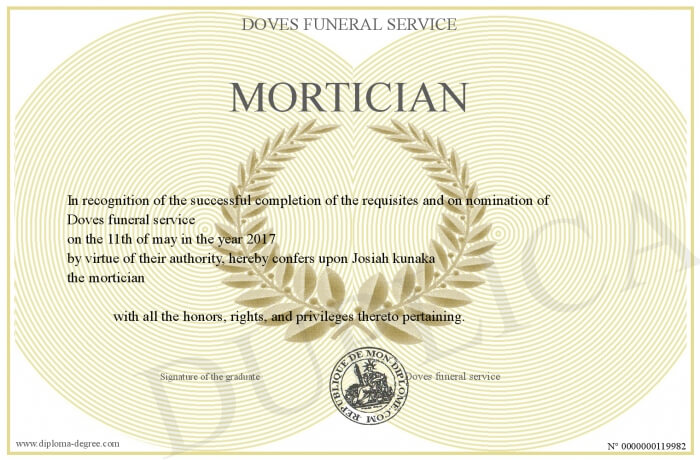What is a Mortician?
After the death of a loved one, many family members don’t want to have to deal with all the ins and outs of a funeral.
That’s where a mortician, also known as a funeral director, comes in.
A funeral director takes the load off of the grieving families back by helping set up a funeral, embalm the body, and prepare it for display in the casket.
There is also a lot of behind the scenes work with paperwork, placing phone calls to various people such as the cemetery and hospital.
A mortician allows the family to grieve, while taking on the big issues.
Duties
A mortician has several duties, some of these include:
- Scheduling the burial
- Coordinating with the crematorium
- Arranging transportation of the body, as well as the funeral guests
- Embalming the body
- Submitting paperwork to the government for a death certificate
- Preparing for the service
- Providing emotional support for family members and loved ones of the deceased
Salary
The average salary for a funeral director is $41,000 a year.
When you first start out, you’ll typically make around $21,000 a year, but as you increase your education and experience, you can make up to $67,000 a year on average.
The states with the highest paid funeral directors are Massachusetts, Delaware, Illnois, New Jersey and South Dakota.
Annually National Average Salary: $56,340
Average Annual Salary by State
| State | Avg. Annual Salary |
|---|---|
| Alabama | $49,160 |
| Arizona | $44,320 |
| Arkansas | $41,630 |
| California | $53,300 |
| Connecticut | $63,480 |
| Delaware | $76,630 |
| Florida | $62,020 |
| Georgia | $52,920 |
| Hawaii | $40,660 |
| Idaho | $67,180 |
| Illinois | $65,520 |
| Indiana | $60,740 |
| Iowa | $69,350 |
| Kansas | $51,670 |
| Kentucky | $42,760 |
| Louisiana | $43,220 |
| Maine | $60,740 |
| Maryland | $54,960 |
| Massachusetts | $59,510 |
| Michigan | $61,900 |
| Minnesota | $73,890 |
| Mississippi | $44,200 |
| Missouri | $52,190 |
| Montana | $52,080 |
| Nebraska | $66,360 |
| Nevada | $50,740 |
| New Hampshire | $75,330 |
| New Jersey | $59,010 |
| New Mexico | $46,040 |
| New York | $66,730 |
| North Carolina | $54,120 |
| North Dakota | $78,710 |
| Ohio | $56,080 |
| Oklahoma | $52,860 |
| Oregon | $50,870 |
| Pennsylvania | $61,060 |
| Rhode Island | $53,190 |
| South Carolina | $49,760 |
| South Dakota | $64,550 |
| Tennessee | $45,840 |
| Texas | $41,130 |
| Utah | $60,680 |
| Vermont | $55,660 |
| Virginia | $67,850 |
| Washington | $60,960 |
| West Virginia | $55,490 |
| Wisconsin | $57,010 |
| Wyoming | $55,420 |
| Puerto Rico | $25,750 |
Annual Average Salary: Top 5 States
The top earning state in the field is North Dakota, where the average salary is $78,710.
These are the top 5 earning states in the field:
* Employment conditions in your area may vary.
How to Become a Mortician
Step 1Educate Yourself
Although being a funeral director may seem like a black and white job, that anyone can do, it’s fairly complicated in reality.
In order for you to become a mortician, you’ll need to at least have an associate’s degree, but some employers suggest obtaining a Bachelors degree.
You’ll want to get a degree in Mortuary Science, and make sure that it’s an accredited school.
Some of the classes that you’ll be taking in this field are professional ethics, anatomy, microbiology, chemistry, pathology, embalming, funeral service psychology and counseling, restorative art, federal regulations and mortuary law.
You may even want to take some business classes so that you can understand that side of the career as well.
Who knows, maybe you’ll have your own funeral home one day.
Step 2Become an Apprentice
The American Board of Funeral Service Education requires future funeral directors to do an apprenticeship for at least one year, but typically three years.
You can do this either before you start your college career, during your college career when you’re taking classes, or even after you graduate.
Though you’ll be able to work in a funeral home and perform certain steps of the funeral process, you’ll have to have supervision at all times.
Step 3Get Licensed
In order to become a mortician you’ll have to pass a state licensing exam.
In order to take the exam, you need to be at least 21 years old, and have completed at least a 2 year education, as well as your apprenticeship.
Some of the subjects that you’ll want to look out for on the exam are psychology, business law, funeral service merchandising, funeral service history, microbiology, pathology, restorative arts, anatomy and embalming
Depending on the state you live in, you might have to take your funeral director exam separate from the embalmer licensing exam.
Step 4Maintain Licensure
That’s right, this isn’t just a one stop shop. You’ll have to keep up with current rules and reuglations in order to stay in business and legal.
Continuing your education can be done through online classes, or in person, it’s up to you.
Education
In order to be a mortician, you’ll need either an associates degree or bachelors degree.
This can take anywhere from 2 to 4 years.
You’ll want to do an apprenticeship during this time as well, which can take another 3 years.
If you want to do your apprenticeship at the same time that you are getting your degree, you can save some time!
Video About The Career
Licensing
All states require a license except for Colorado.
Depending on which state you live in, the laws may vary.
For most states though, you should be 21 years old, complete 2 years in an ABFSE mortuary science program and serve an apprenticeship lasting 1 to 3 years.
Certification Example:

Average Training Program Duration: 4+ Years
Popular Programs
Job Outlook
The job outlook for this career is very favorable.
Those that both licensed funeral directors and embalmers have the best chance of employment.
Many jobs may open due to the fact that many funeral directors are retiring or leave the occupation.
Employment Growth Projection: 3%
2023
2033
That's a higher than average projected growth of 800 jobs.
Mortician: Interest Over Time
Should You Become a Mortician?
Overall Satisfaction: High

The job is fairly satisfactory for most people working as funeral directors.
It is a meaningful job that makes you feel good, for giving the family the last moments with their loved ones.
The hours are long, sometimes you work more than 40 hours a week.
The hours are irregular as well, depending on when people die and when funerals occur.
Average Salary: Medium

It depends on how much education and experience you have.
If you have more education and more experience, you’ll make more money.
Those that first start out make around $20,000.
Those that have been in the field for some time can make roughly $41,000.
Those that are experts in the field, or run their own funeral home can make about $67,000.
Job Growth Outlook: High

In the next ten years, job growth looks as if it is going to be around 3%.
There will be a demand for funeral workers, as death happens every day.
Now that the Baby Boomer generation is getting older, the use of funeral services is becoming more present.
Education Duration: 4+ Years

For an Associates degree, it can take two years.
For a Bachelors degree it can take four years.
Depending on the state you work in, as well as the funeral home you work for, your education may vary.
It also takes around 3 years of apprenticeship before you are able to work on your own.
Personal Skills Needed

- Science skills
- Interpersonal and communication skills
- Business management skills
- Counseling skills
- Strength, both physically and mentally
- Compassion
- Organization and planning skills
- Listening skills
- Tactfulness
- Tolerance of stress
Frequently Asked Questions
Q. What is the average salary of a Mortician?
The average salary of a mortician is around $41,000 a year.
Typically, those who have more experience in the field make more money.
You’ll also make more money if you run your own funeral home.
Those with bachelor’s degrees also typically make more money.
Depending on where you live, you may be required to obtain a bachelor’s degree.
Q. How long does it take to become a Mortician?
The education for mortuary science takes from 2 years to 4 years, depending on if you get your bachelors degree or your associates degree.
However, it will still take you around 3 years to do apprenticeships that allow you to shadow a more experienced mortician.
Q. What does a Mortician do?
Morticians prepare deceased bodies, and get the funeral set up.
They take on all of the important situations that the grieving family would normally have to take care of.
They set up the death certificate, embalm the body, prepare it for viewing, and take care of any paperwork associated with death certificates.
Along with much more, depending on the needs of the family and the deceased persons preferences.
Q. What is the demand for Morticians?
There will always be a demand for morticians, as people die every single day.
If you are licensed in both embalming and funeral directing, and willing to relocate, you will have the best chance of employment.
Q. How Much Does It Cost to Become a Mortician?
That all depends on where you go to school, and what degree you receive but between $38,000 and $150,000 is the normal range.










I would love to learn more
Is a mortuary assistant someone who works along side of a mortician and if so what are the educational requirements for this position? Where can I find more info on being an assistant?
I am an entrepreneurship graduate and I would love to make this a career.
Are there sponsors for visa and appreticeship?
My passport is ready.
how does one start apprenticeship ?
Great article. Ty. Am investing as ownership of a Funeral Home. In Texas.
I’m looking for apprenticeship of mortician.
Hello am from the Caribbean, st kitts and nevis I would love to become a mortician. How do I find out about classes or a mortuary school?
Interested of getting Mortuary School in New Jersey
I would love more information about this school
I have a BSN in nursing and would like information on funeral home director and bodies going through Pittsburgh Mortuary school. How long $ how much for tuition? Thank you
Great thank you for laying out the facts.
This is a really interesting career field and I would be interested in hearing what colleges offer this. I’ve been wanting to go into this field for a while.
I am interested in this field where can I find an apprentice position?
im intrested anyone know of a good site to find more information
I am interested with this job. I am from Tanzania East Africa.
I love that job
I love this career too